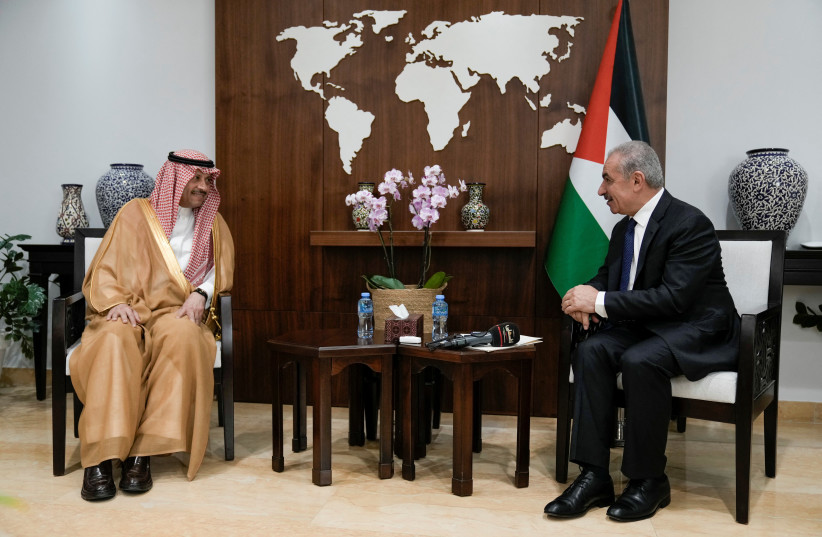Israel contemplates major financial aid to Palestinian Authority after US request
According to Israeli media, the Israeli government is deliberating on providing “huge” financial measures to the Palestinian Authority to ease the dire economic situation, at the request of the US government.
The conservative daily Israel Hayom reported on Sunday that Israel began providing economic aid to the PA by reducing taxes imposed on fuel by 50%.
According to the daily newspaper, the tax is now 1.5%, instead of 3%, as was the case based on previous economic agreements between Israel and the PA.
That step is expected to inject about $22 million (80 million shekels) annually into the Palestinian treasury.
Other, non-monetary options also discussed
Another step being discussed is increasing the number of work permits Israel provides to Palestinians from the West Bank and Gaza to work inside Israel. The paper also reports that Israel has substantially increased transfers of taxes collected on behalf of the PA so far in 2023.

Other steps discussed recently include the approval of a new industrial zone in Tarqumiyah, near the southern West Bank city of Hebron, a move long supported by Israeli security officials, and the extension of operating hours at the Allenby/King Hussein border crossing with Jordan.
The liberal Israeli daily Haaretz reported on Monday that “there are talks with Qatar about transferring financial aid to the Hamas government in the Gaza Strip.”
Some in Israel say the fear of an escalation along the borders with the Gaza Strip may harm the normalization talks and are pushing for economic package to help maintain calm.
Pressure from the US to support the PA
Israeli Prime Minister Benjamin Netanyahu made a decision to reduce the fuel tax on the Palestinian Authority a few months ago, and it was approved by the far-right Finance Minister Bezalel Smotrich, under the pretext of Netanyahu’s commitment to the American government.
The Biden Administration has been applying significant pressure on the Israeli government to improve the economic situation of the PA, for fear that it is on the verge of economic collapse.
Prof. Efraim Inbar, president of the Jerusalem Institute for Strategy and Security, told The Media Line that these reports were credible given the PA’s desperate financial need, but he downplayed its connection to the normalization talks underway.
“They are in my view connected primarily to the escalation in violence in the West Bank this year,” says Inbar.
“The defense establishment has always been in favor of easing the lives of the Palestinians because they believe less economic difficulties mean less terrorism,” says Inbar.
The Saudi Arabia factor
The Biden Administration has been working relentlessly to secure a historic normalization deal between Saudi Arabia and Israel, and as part of those efforts, the US has reportedly placed considerable pressure on Netanyahu’s government to take “steps toward bolstering the PA,” which include letting Riyadh send funds to Ramallah.
Late last August, The Wall Street Journal reported that Saudi Arabia had proposed resuming financial aid to the Palestinian Authority.
Riyadh’s monthly payment of approximately $20 million to the Palestinians was suspended in 2021 due to concerns about the Palestinian Authority’s inefficiency and allegations of widespread corruption.
Saudi Arabia has historically been a steadfast supporter of the Palestinian cause, both diplomatically and financially.
Inbar says the Palestinian issue “is not the sole driving force behind normalization talks between Saudi Arabia and Israel.”
“I think Saudi Arabia is flexible on the Palestinian issue; it’s a secondary issue. The Saudis’ most important demands are toward America and not toward Israel. The Palestinians have always been a side dish,” says Inbar.
Appeasing the PA and securing Palestinian approval is considered crucial to the United States, as it would eliminate what the US government sees as a significant obstacle, paving the way for substantive discussions aimed at a landmark agreement.

How dire is the situation of the PA, really?
Dr. Nasr Abdel Kareem, professor of finance and economics in the Graduate Studies Department at the Arab American University in Ramallah, told The Media Line that news of the PA’s financial demise is “greatly exaggerated.”
“The issue that the PA is facing severe challenges to its economy is not new, and the PA has been able to deal with these difficulties.”
Abdel Kareem insists that financial needs will not persuade Palestinians to accept a normalization deal that circumvents their political rights and ambitions.
Palestinians believe that Saudi Arabia is committed to the Palestinian cause.
“This potential normalization deal obviously is important to the Americans, Israelis, and Saudis but it doesn’t mean the Palestinians will welcome breadcrumbs for them to accept it,” says Abdel Kareem.
Abdel Kareem says securing Palestinian approval is vital, but dangling the dollar sign is the wrong way; rather, the Biden Administration should use its might to revive the stalled peace process.
“President Biden made many promises during his campaign, and he has hardly delivered on any of them. He should use the US influence and exert pressure on Israel to reach a political resolution. We don’t need money, we want to end the occupation,” says Abdel Kareem.
Such a normalization deal would be considered groundbreaking—potentially eclipsing even the impact of the Camp David peace treaty signed between Israel and Egypt in 1978—and could significantly influence other Arab and Muslim nations, encouraging them to follow suit.





Comments are closed.